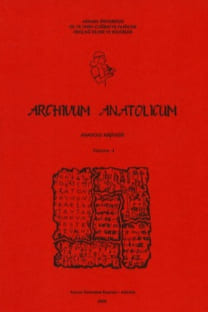KSENOPHON’UN KYROS’UN EĞİTİMİ ESERİNDE TANRIKRAL PARADİGMASI
Klasik Çağ Yunan yazarı Ksenophon devlet yönetiminin esaslarına ilişin fikirlerini, Kyros’un Eğitimi (Κύρου Παιδεία) adlı eserinde tarihi gerçekliğinden bağımsız olarak kurguladığı Büyük Kyros karakteri üzerinden sunmuştur. Kyros’un Eğitimi, Platon’un Devlet Adamı (Πολιτικός) adlı eserinin ışığında okunduğunda, Ksenophon’un bu eserde yönetim bilgisi ve tanrısallığı Sokratik erdemle ilişkilendirerek ele aldığı görülmektedir. Ksenophon’un böylece Sokratik gündemi olan yönetme erkinin ve tanrısallığın dayanağı olarak sunduğu erdem (aretē) kavramına canlı bir örnek (paradeigma) olarak Kyros’u kurguladığı anlaşılmaktadır. Buna göre Kyros’a biçilen tanrı-kral imgesi, farklı kent (polis) devletlerinin koruyucu tanrılarının üstünde bir siyasi oluşuma duyulan ihtiyacı vurgulamak için bir kral kültü olarak oluşturulmuştur. Bu yeni kült Büyük İskender’e ve Roma döneminin krallarına yönetimlerinin meşruiyetini sağlamak için de başvurulan bir bağlam oluşturmuştur. Rönesans sonrası ise yaşanan din savaşları yine dinin üzerinde bir siyasi oluşuma ihtiyaç göstermiş ve Ksenophon’un tanrı-kralı bugünün devletine dönüşmüştür. Ancak Kyros’un Eğitimi eserinde Kyros portresi üzerinden yaratılan tanrı-kral imgesi, bu süreçte yönetim erkinin tasavvuru için bir paradigma olmayı sürdürmüştür.
God-King Paradigm in Xenophon’s Cyropaedia
Greek classical period author Xenophon has presented his ideas on the principles of state rule in his work Education of Cyrus (Cyropaedia), through the fictitious character Cyrus the Great, he builds independent of his historical reality. When read under the light of Plato’s Statesman (Politicus), it can be seen that Xenophon build Cyrus as a living example (paradeigma) to the concept of virtue (aretē) he presents as the foundation of the capability to rule and divine interaction, for his Socratic agenda. Accordingly, the god-king image appraised for Cyrus has been constructed for a political formation required to be above the guardian gods of different city states as a king cult. This new cult has formed a context to be called upon by Alexander the Great and the Roman kings to maintain the legitimacy of their reign. The post renaissance religious wars have again required a political formation above religion and Xenophon’s god-king transformed in to the modern state. However, the image of god-king created with the portrait of Cyrus at Cyropaedia, remained to be a paradigm for the imagination of the capability to rule during this process.
___
- (Çevirmen yok) Kitab-ı Mukaddes, Eski ve Yeni Ahit (Tevrat ve İncil) (İbrani, Kildani ve Yunani dillerinden son tashih edilmiş tercümedir), İstanbul, Kitab-ı Mukaddes Şirketi, 1941.
- (Yazarı yok) “Hilâfetin İlgâ ve Hânedân-ı Osmâniyye’nin Türkiye Cumhûriyyeti Memâliki Hâricine Çıkarılmasına Dair Kanun”, Resmî Cerîde (Resmi Gazete), 6 Mart, 1924 (Sayı:63). Erişim adresi: https://www.resmigazete.gov.tr/arsiv/ 63.pdf.
- Ağaoğulları, Mehmet Ali ve Akal, Cemal Bâli ve Köker, Levent. Kral Devlet ya da Ölümlü Tanrı. Ankara: İmge Yayınevi, 1994.
- Antela-Bernárdez, Borja. “Like Gods among Men: The Use of Religion and Mythical Issues during Alexander’s Campaign”, Krzysztof Ulanowski (ed.), The Religios Aspects of War in the Ancient Near East, Greece and Rome, 235-255. Leiden: Brill, 2016.
- Atatürk’ün Söylev ve Demeçleri: Cilt II (1906-1938), Nimet Unan (ed.), Ankara: Türk Tarih Kurumu Basımevi, 1959.
- Azoulay, Vincent. “Cyrus, disciple de Socrate? Public et prive dans l’oeuvre de Xenophon”, Études Platōniciennes VI, (2009): 153-173.
- Brock, Roger. Greek Political Imagery from Homer to Aristotle. London: Bloomsbury Academic, 2013.
- Brondel, Ruby. “The Politics of Weaving in Plato’s Statesman”, Efi Kyprianidou (ed.), Weaving Culture in Europe, 27-51. Athens: Nissos Publications, 2017.
- Browning, Robert. “Greeks and Others: From Antiquity to the Renaissance” Thomas Harrison (ed.), Greeks and Barbarians, 257-277. New York: Routledge, 2002.
- Cachia, Nicholas. The Image of the Good Shepherd as a Source of the Spirituality of Ministerial Priesthood. Roma: Gregorian University Press, 1997.
- Fustel De Coulanges, Numa Denis. The Ancient City: A Study on te Religion, Laws and Institutions of Greece and Rome. Ontario: Batoche Books, 2001.
- Hacımüftüoğlu, Halil. Kral Tanrı: Allah’ın Krallığı. İstanbul: İletişim Yayıncılık, 2011.
- Hartog, François. Herodotos’un Aynası: Öteki Tasavvuru Üzerine Bir Deneme. Çev. Mehmet Emin Özcan. İstanbul: İthaki, 2014.
- Hobden, Fiona ve Tuplin, Chritopher, “Introduction”, F. Hobden, C. Tuplin (ed.), Xenophon: Ethical Principles and Historical Enquiry, 16-20. Leiden: Brill, 2012.
- Kantorowicz, Ernst H. The King’s Two Bodies: A Study in Mediaeval Political Theology. New York: Princeton University Press, 1997.
- Lutz, Mark J. “The Confrontation between Classical Political Philosophy and the Gods of the City”, D. E. Tabachnick, T. Koivukoski, H. M. Teixeira (ed.), Challenging Theocracy: Ancient Lessons for Global Politics, 10-37. Toronto: University of Toronto Press, 2018.
- Mikalson, Jon D. Greek Popular Religion in Greek Philosophy. New York: Oxford University Press, 2010.
- Newey, Glen. Routledge Philosophy GuideBook to Hobbes and Leviathan New York: Routledge, 2008.
- Scullion, Scott. “Herodotus and Greek Religion”, Carolyn Dewald, John Marincola (ed.), Cambridge Companion to Herodotus, 192-208. New York: Cambridge University Press, 2006.
- Steiris, George. “Machiavelli’s Appreciation of Greek Antiquity and the Ideal of Renaissance”, A. Lee, P. Péporté, H. Schnitker (ed.), Renaissance? Perceptions of Continuity and Discontinuity in Europe, c.1300- c.1550, 81-94. Leiden: Brill, 2010.
- Tuplin, Christopher. “Xenophon’s Cyropaedia: Fictive History, Political Analysis and Thinking with Iranian Kings”, Lynette Mitchell, Charles Melville (ed.), Every Inch a King: Comparative Studies on Kings and Kingship in the Ancient and Medieval Worlds, 67-91. Leiden: Brill, 2013.
- Vlastos, Gregory. Socrates Ironist and Moral Philosophy. Princeton: Princeton University Press, 1991.
- Yalazı, Esra ve Sultan Deniz Küçüker, “Ksenophon’un Oikonomikos Adlı Eserinde Evlilik ve Kadına Yaklaşım”, Archivum Anatolicum 9/2, (2015): 57-90. Yalazı, Esra. “Aiskhylos, Herodotos ve Ksenophon’da Persler”, Doktora Tezi, Ankara Üniversitesi, 2019.
- ISSN: 1300-6355
- Yayın Aralığı: 2
- Başlangıç: 1995
- Yayıncı: Ankara Üniversitesi Dil ve Tarih-Coğrafya Fakültesi
